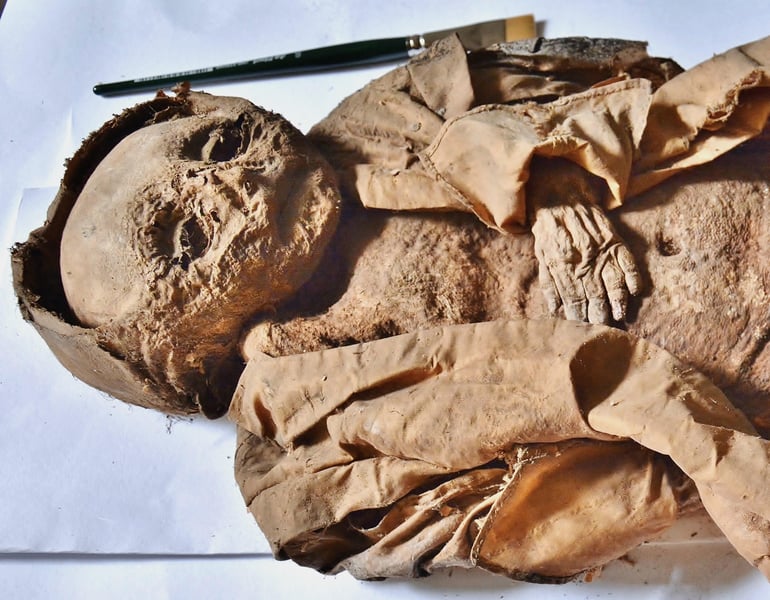Get Healthy!
Results for search "History of Medicine".
Health News Results - 14
A 4,000-year-old skull provides evidence that ancient Egyptians might have tried to treat cancer, a new study claims.
Microscopic observation of the skull revealed 30 or so lesions scattered across its surface that are consistent with cancer, researchers report.
T...
- HealthDay Reporter
- Dennis Thompson
- |
- May 29, 2024
- |
- Full Page
Rare gene-driven defects such as Down syndrome have occurred among human beings for many thousands of years, a new analysis of ancient DNA has revealed.
Not only did the birth defects exist, but these infants were often buried with care by their community. That suggests they were included as part of the community despite their differences, researchers said.
Six cases of Down syndrom...
- HealthDay Reporter
- Dennis Thompson
- |
- February 21, 2024
- |
- Full Page
It has long been believed that the 1918 flu pandemic disproportionately affected healthy young adults, but a study of human remains tells a different story.
Together, Canadian and American researchers found that preexisting medical conditions like asthma and lower income increased the likelihood of death, just as in other pandemics, including COVID-19.
"Our circumstances -- soc...
- HealthDay Reporter
- Cara Murez
- |
- October 10, 2023
- |
- Full Page
The 15th century prince who inspired the literary vampire Dracula may have had medical issues that caused him to cry tears of blood, according to researchers unearthing this ancient mystery.
The prince, who was also a military leader, was known as Vlad III, Voivode of Wallachia and as Vlad the Impaler. He was also called Vlad Drăculea, translating to "the son of the dragon," and may ...
- HealthDay Reporter
- Cara Murez
- |
- August 18, 2023
- |
- Full Page
Scientists have found evidence of ancient parasites preserved in the dung of an aquatic predator from more than 200 million years ago.
The ancient predator -- believed to be an extinct crocodile-like reptile called a phytosaur -- was infected with nematodes and multiple other parasite species.
While parasites are a common and important part of ecosystems, ancient parasites are hard ...
- HealthDay Reporter
- Cara Murez
- |
- August 10, 2023
- |
- Full Page
Cervical cells from Henrietta Lacks, a cancer patient who died more than 70 years ago, are a cornerstone of modern medicine, but her family has never been compensated for the cells taken without her knowledge.
Until now.
Thermo Fisher Scientific of Waltham, Mass., has settled a lawsuit filed in 2021 by the...
- HealthDay Reporter
- Cara Murez
- |
- August 1, 2023
- |
- Full Page
Genetic analysis of Ludwig van Beethoven's hair has provided new clues into the cause of the great composer's death in 1827 -- as well as evidence of a family scandal.
The analysis revealed that Beethoven suffered from a hepatitis B infection that could have contributed to his death from liver disease.
Researchers found DNA evidence of hepatitis B virus in a lock of hair taken from ...
- HealthDay Reporter
- Dennis Thompson
- |
- March 22, 2023
- |
- Full Page
While the origins of smallpox has remained a mystery for centuries, researchers now believe that it dates back 2,000 years earlier than previously thought.
Until recently, the earliest genetic evidence of smallpox, the variola virus, was from the 1600s. And in 2020, researchers found evidence of it in the dental remains of Viking skeletons, pushing its existence 1,000 years earlier.
- HealthDay Reporter
- Cara Murez
- |
- January 11, 2023
- |
- Full Page
That special link you may have with a purring, four-legged friend has been going on between the species for millennia, new research shows.
The human-cat relationship was probably forged over a shared interest in rats more than 10,000 years ago, investigators say. As farming became a way of life, cats served as ancient pest control, killing rodents and making a bond with people that contin...
- HealthDay Reporter
- Cara Murez
- |
- December 8, 2022
- |
- Full Page
A "virtual autopsy"of a mummified 17th century Austrian infant has shed new light on Renaissance childhood -- as well as the importance of vitamin D to health.
The researchers used CT scans to examine the remains, which had been found in an aristocratic Austrian family crypt containing the perfect condit...
- HealthDay Reporter
- Dennis Thompson
- |
- October 26, 2022
- |
- Full Page
Skeletal remains of a young adult discovered in a remote cave in Borneo appear to be the oldest known case of surgical amputation.
Australian and Indonesian researchers estimate the bones are at least 31,000 years old. It appears that the young adult lost his foot and lower leg in childhood and lived for at least six to nine more years after that, they said.
"
Medieval monks were much more wormy than average folks, a new archaeological analysis has revealed.
Those living in medieval Cambridge were nearly twice as likely to be infected by intestinal parasites as city dwellers, researchers found.
Even though Augustinian friars had access t...
- HealthDay Reporter
- Dennis Thompson
- |
- August 19, 2022
- |
- Full Page
Researchers have long suspected that humans evolved to tolerate dairy products in order to reap their health benefits. Now a new study refutes that idea.
Around one-third of the world's population possesses a gut enzyme that allows them to digest lactose, a sugar in milk. Those lucky individuals -- mostly of European heritage -- can feast on dairy products without suffering digestive woes...
- HealthDay Reporter
- Amy Norton
- |
- July 27, 2022
- |
- Full Page
A centuries-old mystery as to the origins of the Black Death has been solved, according to an international team of scientists.
They said the plague pandemic that killed up to 60% of people in Europe, the Middle East and northern Africa in the mid-1300s originated in central Asia in what is now Kyrgyzstan.
Plague first entered the Mediterranean in 1347 on trade ships from the East. ...
- HealthDay Reporter
- Robert Preidt
- |
- June 15, 2022
- |
- Full Page

















